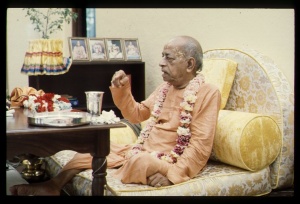SB 10.4.10-11

A.C. Bhaktivedanta Swami Prabhupada
TEXTS 10-11
- divya-srag-ambarālepa-
- ratnābharaṇa-bhūṣitā
- dhanuḥ-śūleṣu-carmāsi-
- śaṅkha-cakra-gadā-dharā
- siddha-cāraṇa-gandharvair
- apsaraḥ-kinnaroragaiḥ
- upāhṛtoru-balibhiḥ
- stūyamānedam abravīt
SYNONYMS
divya-srak-ambara-ālepa—she then assumed the form of a demigoddess, completely decorated with sandalwood pulp, flower garlands and a nice dress; ratna-ābharaṇa-bhūṣitā—decorated with ornaments of valuable jewels; dhanuḥ-śūla-iṣu-carma-asi—with bow, trident, arrows, shield and sword; śaṅkha-cakra-gadā-dharā—and holding the weapons of Viṣṇu (conchshell, disc and club); siddha-cāraṇa-gandharvaiḥ—by the Siddhas, Cāraṇas and Gandharvas; apsaraḥ-kinnara-uragaiḥ—and by the Apsarās, Kinnaras and Uragas; upāhṛta-uru-balibhiḥ—who brought all kinds of presentations to her; stūyamānā—being praised; idam—these words; abravīt—she said.
TRANSLATION
The goddess Durgā was decorated with flower garlands, smeared with sandalwood pulp and dressed with excellent garments and ornaments made of valuable jewels. Holding in her hands a bow, a trident, arrows, a shield, a sword, a conchshell, a disc and a club, and being praised by celestial beings like Apsarās, Kinnaras, Uragas, Siddhas, Cāraṇas and Gandharvas, who worshiped her with all kinds of presentations, she spoke as follows.